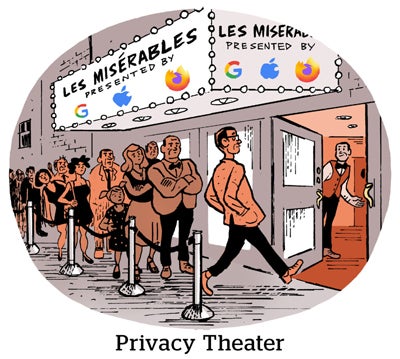Here’s today’s AdExchanger.com news round-up… Want it by email? Sign up here.
Topics Of Concern
The Chrome Topics API, Google’s proposed third-party-cookie replacement, may perpetuate problems that plagued digital advertising and which the product aims to solve, writes Aram Zucker-Scharff, The Washington Post’s engineering lead for privacy and security, in a personal blog post.
If Topics become a preferred system for defining audiences, ad tech intermediaries will look to compete with Google and differentiate themselves in a Topics-based marketplace by creating closed-source Topics prediction solutions and proprietary “Shadow Topics,” he writes.
Large ad tech vendors that run their scripts across a wide variety of domains will be further advantaged, he predicts, and because of these vendors’ capacity to catalog reams of user behavioral data, existing privacy concerns will be magnified.
Smaller publishers will optimize toward single-topic domains with narrow content focus to maximize buyer interest in their inventory – essentially creating a new version of content farms. Meanwhile, publishers with a more generalized focus will be devalued and must rely on third-party scripts to effectively participate in the Topics marketplace, potentially increasing the share of revenue publishers cede to ad tech.
But if publishers and end-users are given more control over the Topics ecosystem, the death of the cookie could still signal a fairer, more privacy-safe internet, says Zucker-Scharff.
Drop Till You Shop
Social commerce has taken hits lately.
Every social platform is trying to get people to hit “purchase” within their walls. Pinterest released new shopping API features. YouTube debuted a shoppable ad format and live shopping products. And Amazon offers QVC-like live shopping hosted by influencers.
But traction has been super slow. Companies like YouTube and Pinterest increasingly point to partners like Shopify, rather than try to build their own on-platform shopping. Even TikTok, the most shopping-native of social platforms (Douyin, the original Chinese version of TikTok by the same parent company, is a huge shopping platform in the country), hasn’t been able to translate to Europe or North America. Last month, TikTok called off its live shopping product rollout in the UK before it expanded to the EU or US.
And just last week, Meta flew a flag of defeat. Facebook will shut down its live shopping feature at the end of September and, on Friday, news broke that Instagram is alerting influencers that it will shut down its affiliate commerce program starting August 31, Digiday reports.
Influencers can still tap into other affiliate networks by tagging specific shopping URLs in posts, but Instagram folded on being the affiliate program operator.
Pay To Play
One potential boon to social commerce may come from the company that’s currently doing more than anyone else (including privacy law enforcers) to undercut social platform shopping and ad targeting. Which is Apple, of course.
The iOS16 beta is now in developer hands and in beta for WebKit, Apple’s browser code. Developers have spotted Apple Pay across all browsers (at least for iPhone users), Gizmodo reports.
The news bubbled on Reddit and in screenshots on Twitter, as developers began to spot Apple Pay button options on Edge, Chrome and Firefox (which all must use WebKit as their base code in order for iOS users to download the browsers).
The change, far from Apple overstepping, could actually offer some basic antitrust protection for Apple, which is under fire for refusing to allow outside payment processing across its services. Apple Pay integration would be a boon to social commerce because the service would give platforms like Facebook, Instagram, Pinterest, et al., a way to link people somewhere for an easy purchase, potentially even from within an in-app browser. Currently, shopping on in-app browsers is a mess.
But Wait, There’s More!
WPP boosts sales outlook but falls short of investors’ expectations. [Reuters]
The future of global retail will be local. [Financial Times]
Congress wants the FTC to create a bureau dedicated to privacy. [Marketing Brew]
Quantcast cuts headcount by 6% as economic storm clouds gather. [Digiday]
A cottage industry is persuading people to spend thousands to create video businesses on YouTube. It’s harder than it looks. [NYT]














